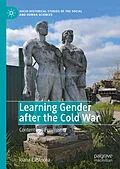This book explores the role and place of feminist politics in the transformation of the former socialist world and points out the geopolitical mechanisms involved in the deployment of technocratic norms, expert discourses, activist repertoires and academic knowledge on women's rights and gender equality in the 1990s-2000s.
Autorentext
Ioana Cîrstocea is a Sociologist at the French National Centre for Scientific Research, CNRS, and a member of the European Centre for Sociology and Political Science, CESSP, Paris, France. Her research focuses on intellectual spaces and actors in Eastern Europe and on the production, circulation and usages of feminist knowledge in (post)-Cold War settings.
Inhalt
1. (Re)making "Gender", (Un)making "Eastern Europe". Introduction.- I. Transnational mobilisations. From discovering the "post-socialist Other" to professional activism beyond borders.- 2. Reviving Feminist Internationalism after the Cold War.- 3. The "NGO-isation of Feminism" in the Making.- II. The Institutional Building of International Gender Expertise.- 4. A Democracy-Making Mission.- 5. Aims and Scope of an International Gender-Studies Programme.- 6. Gender, Feminism and Philanthropic Work.- III. A Sociography of Eastern European "Gender Pioneers".- 7. Feminist Scholars, Activists and Experts.- 8. Gender Studies and the Higher Education Reform in Romania.- 9. A Counterpoint from the Former Yugoslavia.- Going Global. Conclusion.
